Exploring Preschool Kitchens: Culinary Learning in Early Ed
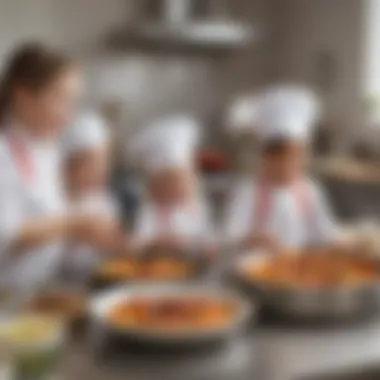
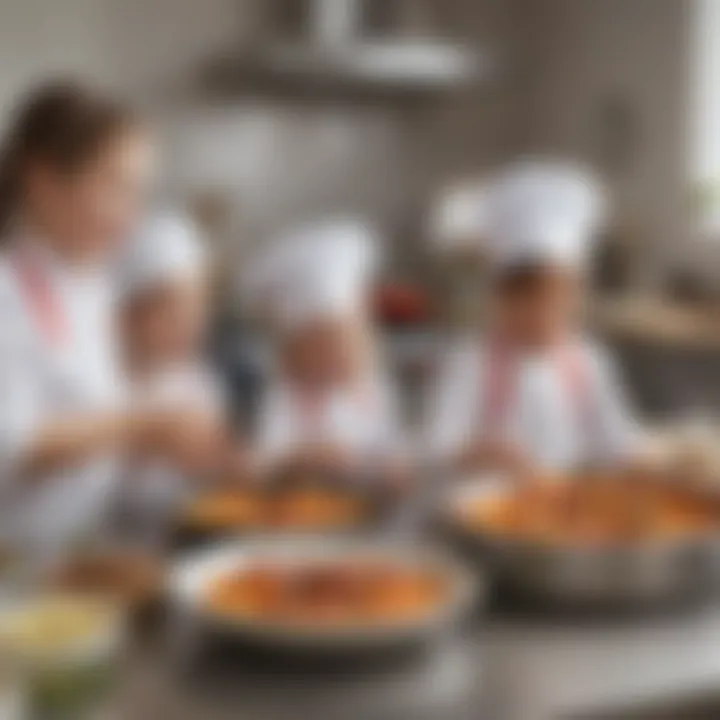
Intro
The concept of preschool kitchens is gaining traction in the realm of early childhood education. Understanding the significance of culinary environments in shaping young minds is crucial. These kitchens serve as practical settings for children to engage with food, enhancing their educational experience through direct involvement.
Culinary practices not only address nutritional needs but also support cognitive development and social interactions. When preschoolers participate in cooking activities, they develop essential motor skills and foster a sense of independence. By immersing themselves in the kitchen, children learn about healthy food choices, contributing to their overall growth.
This article aims to explore the multi-faceted role of preschool kitchens in early education. We will outline how interactions in these settings can lead to increased creativity and collaboration among peers. The following sections will provide a detailed analysis of how engaging children in cooking can prepare them for a healthier future.
Prelims to Preschool Kitchens
Preschool kitchens represent an innovative approach within the educational landscape, where culinary activities intertwine with learning objectives for early childhood education. This section emphasizes the importance of integrating cooking experiences into preschool curriculums. Engaging children in hands-on kitchen activities cultivates essential life skills, instills a sense of curiosity, and offers a platform for social interactions.
Culinary endeavors in a preschool setting provide a tangible context for experiential learning. Children can grasp concepts of measurement, cause and effect, and even basic science through cooking. The elements of taste and nutrition also tie into broader educational goals, linking culinary practices to health awareness from an early age.
In a world increasingly dominated by technology, preschool kitchens bring practicality back to learning. They foster a safe environment where children can explore flavors and textures while understanding their origins. The foundation laid in these experiences can extend far beyond the preschool years, influencing children’s dietary choices and promoting lifelong healthy habits.
Defining the Preschool Kitchen
A preschool kitchen goes beyond mere food preparation; it is a dedicated space designed to educate young minds about cooking, nutrition, and teamwork. The setup typically includes age-appropriate tools and equipment tailored to the capabilities of preschoolers. This environment encourages exploration and creativity—enabling children to experiment with various ingredients, follow simple recipes, and understand the importance of cleanliness and organization in the kitchen.
This setting does not just serve as a cooking space; it can be seen as a miniature learning center emphasizing sensory experiences. Children are free to touch, smell, taste, and visually explore food. Such interaction is pivotal in developing critical thinking and problem-solving skills, making learning both engaging and enjoyable.
Historical Context
The concept of incorporating culinary experiences in early education is not entirely new. The evolution of preschool culinary practices can be traced back to various educational philosophies that recognize the importance of holistic learning. For instance, Montessori and Waldorf approaches have emphasized practical life skills—encouraging children to engage in cooking as part of their daily routine.
Through the decades, the shift towards a more integrated curriculum has allowed preschool kitchens to gain prominence. In the mid-20th century, interest in nutrition and child development surged amid concerns about childhood obesity and dietary health, particularly in developing countries. Educational institutions began to recognize the kitchen as a valuable pedagogical tool where children could learn about food, culture, and healthy choices.
As society’s understanding of healthy eating deepened, preschool kitchens evolved. Today, they are viewed as integral to early education, embedding nutritional awareness into learning outcomes. This historical underpinning is crucial to recognize as it influences current practices and shapes future culinary educational trends.
The Role of Cooking in Early Childhood Education
Cooking plays a vital role in early childhood education. It goes beyond mere food preparation; it serves as a multidimensional tool for learning. Engaging preschoolers in cooking activities cultivates their cognitive abilities, enhances social interactions, and refines motor skills. These aspects collectively contribute to a holistic educational environment. The skills gained in the kitchen translate into vital life competencies.
Cognitive Development Through Cooking
When children cook, they encounter various concepts such as counting, measuring, and following sequential steps. These activities require critical thinking and problem-solving skills. For instance, while measuring ingredients, children learn about volume and unit comparisons. They also develop patience, as cooking often takes time and attention.
Through cooking, children can relate abstract concepts to tangible actions. For example, they see the transformation of raw ingredients into a final dish, reinforcing their understanding of cause and effect. Additionally, incorporating discussions about nutrition during cooking reinforces knowledge about food origins and health benefits, which further enriches their cognitive development.
Social Skills and Collaboration
Cooking is inherently a collaborative activity. In a preschool kitchen, children work with peers, learning to communicate and cooperate effectively. They share tasks, negotiate roles, and resolve conflicts that may arise during group cooking. This social interaction fosters teamwork and builds strong relationships among children.
Moreover, cooking as a group encourages children to express their opinions and listen to others. They may suggest different flavors or techniques, allowing them to practice articulating ideas and considering diverse perspectives. This exchange is essential in developing social awareness and empathy.
Enhancing Motor Skills
Cooking requires various fine motor skills. Chopping vegetables, stirring batter, and rolling dough engage hand-eye coordination and dexterity. These activities enable children to strengthen their small muscles, which are critical for writing and other daily tasks.
In addition, using different cooking tools, like measuring cups or whisks, introduces children to various grips and movements. Regular practice with these tools enhances their ability to manipulate objects effectively.
Engaging in such tasks helps children gain confidence in their physical abilities. As they master new skills, their enthusiasm for cooking and learning also increases.
"Cooking provides an opportunity for experiential learning, essential for children's growth in multiple domains."
Nutritional Education in Preschool Kitchens
Nutritional education is crucial for children in their formative years. In preschool kitchens, it serves as a foundation for not just cooking skills but also for understanding food, health, and well-being. Early exposure to proper nutrition can lead to lifelong healthy habits, better academic performance, and improved physical health. The preschool kitchen offers a rich environment for engaging children in learning about the foods they eat while promoting healthy choices in a hands-on manner.


Understanding Food Groups
Understanding food groups is a key aspect of nutritional education. Educators help children learn about the five main food groups: fruits, vegetables, grains, protein, and dairy. Each group plays an essential role in a balanced diet. For instance, fruits and vegetables provide vitamins and minerals needed for growth. Grains offer energy while proteins support body repair.
Children can experience these food groups through cooking activities. For example, making a fruit salad not only teaches them about fruits but also encourages them to taste and explore different flavors. Educators can discuss the colors, textures, and benefits of various foods while the children prepare them, enhancing their understanding through experience.
Establishing Healthy Eating Habits
Establishing healthy eating habits early in life sets the tone for future dietary choices. In preschool kitchens, children engage in activities that promote understanding and appreciation for nutritious foods. Simple lessons about portion sizes, the importance of hydration, and the difference between processed and natural foods pave the way for informed choices.
Educators can create structured cooking sessions where children prepare meals together. This communal experience fosters discussions about meal planning and healthy substitutions. For instance, choosing whole grains over refined options can be an engaging topic. Adding spinach to a smoothie can be fun and educative, promoting creativity in food choices.
"Introducing children to nutritional principles in a preschool kitchen not only builds culinary skills but also nurtures an awareness of food's importance in health and growth."
Overall, nutritional education in preschool kitchens provides essential knowledge and practical skills. This foundation lays a pathway toward healthier lifestyles and well-rounded development. Engaging children in these topics opens doors to lifelong learning about nutrition and self-care.
Creating a Safe Kitchen Environment for Children
Creating a safe kitchen environment for children is crucial in preschool kitchens. Safety is not just about preventing accidents; it also ensures that children feel comfortable and confident in the kitchen. This kind of space encourages exploration and learning, allowing children to engage in cooking activities without fear of injury.
When designing preschool kitchens, several elements must be considered. First, it is important to have clear safety protocols in place. These protocols serve as guidelines for children and educators, making expectations clear and structured.
Additionally, the layout of the kitchen should be intuitive for young learners. Ensuring that work surfaces are at an appropriate height for children can help prevent accidents. Keeping pathways clear of clutter is also essential to avoid tripping hazards.
Moreover, educating children about kitchen safety is equally important. Teaching them the proper use of utensils and equipment will empower them and instill a sense of responsibility.
Safety Protocols
Establishing safety protocols involves defining clear rules around various kitchen activities. Children should be educated on the importance of washing hands before handling food. Safety should include guidelines for using kitchen appliances safely. For instance, children should be taught to be cautious around hot surfaces and sharp knives. Educators must demonstrate these rules and monitor adherence to them.
Some key elements of safety protocols for preschool kitchens include:
- Supervision: Always have an adult present during cooking activities.
- Emergency Procedures: Clearly outline what to do in case of an accident.
- First Aid Kits: Ensure that a well-stocked first aid kit is accessible in the kitchen area.
- Fire Safety: Educate children on fire safety measures, including the location of fire extinguishers and the need to stay away from open flames.
"A safe kitchen allows children to explore culinary arts without fear, fostering a positive learning environment."
Child-Friendly Utensils and Equipment
Choosing the right utensils is vital for creating a safe kitchen for children. Child-friendly utensils are typically designed with safety features and ergonomic handles to aid small hands. For example, using plastic knives instead of sharp metal ones allows children to learn cutting skills while minimizing injury risk.
Common child-friendly kitchen items include:
- Soft-edged knives: These knives can cut soft fruits and vegetables safely.
- Measuring cups: Clear, simple measuring tools help children understand quantities without complex measurements.
- Aprons: Wearing an apron protects clothing and encourages a sense of belonging in the kitchen.
- Non-slip mats: Placing these under step stools helps to prevent slips and falls.
Using visually appealing colors and playful designs can make the kitchen environment more engaging for children. These simple yet effective adjustments significantly enhance safety while teaching essential culinary skills.
Practical Cooking Activities for Preschoolers
Engaging preschoolers in practical cooking activities is an effective method to enhance their learning experience. Involving children in the kitchen fosters practical skills, promotes social interaction, and lays a foundation for healthy habits. Learning through cooking addresses multiple learning styles, making it a rich environment for growth. Children can apply what they learn in other subjects, such as math and science, in real-life contexts.
Cooking promotes teamwork and encourages children to communicate effectively, which is vital in their social development. They are not only following a recipe but also developing critical thinking as they make decisions about ingredients and cooking methods. The sensory experience of cooking allows children to explore textures, colors, and smells, stimulating their cognitive development.
Age-Appropriate Recipes
When considering age-appropriate recipes for preschoolers, it is essential to balance simplicity with the opportunity for experiential learning. Recipes should involve tasks that are manageable, allowing children to actively participate without feeling overwhelmed. Simple recipes like fruit salad or no-bake energy bites offer hands-on experience while necessitating basic skills like peeling, chopping, and measuring.
Some
- Fruit Salad: Children can pick their favorite fruits, wash them, and help cut them into pieces. This encourages sensory exploration and discussions about nutrition.
- Mini Pizzas: Using pre-prepared dough and toppings, children learn about portion control while being creative.
- Smoothies: Adding different fruits to a blender fosters understanding of combinations and balance in flavors.
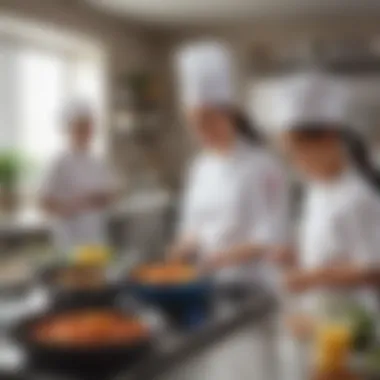

These recipes can stimulate curiosity and inspire confidence in their cooking abilities. They allow room for creativity while ensuring safety.
Group Cooking Projects
Group cooking projects are beneficial in a preschool setting as they not only enhance the cooking experience but also build a sense of community among children. Working in groups allows children to collaborate, share responsibilities, and develop social skills. They can take turns measuring ingredients or mixing different components, which reinforces teamwork.
Examples of group cooking projects include:
- Cooking Around the World: Each week, children can learn and prepare a dish from a different culture, broadening their understanding of global cuisines.
- Gardening and Cooking: Growing herbs or vegetables can teach children about food origins. Afterwards, they can use the produce in a simple dish, reinforcing the cycle from farm to table.
- Themed Cooking Days: Pancake day, cookie decorating, or holiday treats can be fun ways to engage children in special projects, allowing them to feel ownership of the creation process.
These projects not only enhance The cooking knowledge of children but provide them with essential skills that extend beyond the kitchen. They learn about perseverance, communication, and the joy of creating something together as a group.
"Cooking is a perfect activity for preschoolers, combining learning, fun, and bonding in the kitchen."
Overall, practical cooking activities for preschoolers represent a comprehensive approach to learning. Through engaging and age-appropriate recipes and group projects, children can discover the joys of cooking while developing essential cognitive, social, and emotional skills.
The Impact of Cooking on Emotional Development
The emotional development of young children is a critical component of their growth. In the context of preschool kitchens, cooking provides a unique platform that significantly contributes to this aspect of early education. Engaging children in culinary activities allows them to express their emotions, gain a sense of accomplishment, and nurture their independence. Not only does this foster positive emotional growth, but it also lays the foundation for developing self-esteem, resilience, and social-emotional skills that will benefit them throughout their life.
Fostering Independence and Confidence
Encouraging children to take part in cooking activities cultivates a sense of independence. When a child has the opportunity to choose a recipe or select ingredients, they begin to make decisions for themselves. This decision-making process is essential for building confidence. As kids follow through on their choices, they see tangible outcomes from their actions—whether it is a perfectly sliced vegetable or a beautifully baked cake.
Each completed task, no matter how simple, contributes to their growing independence. Moreover, the hands-on nature of cooking addresses several developmental milestones. For example, measuring ingredients and stirring mixtures require precision, which helps enhance focus and concentration.
Parents and educators can reinforce this sense of autonomy by allowing children to experiment in the kitchen. They should feel supported in their attempts, whether that means encouraging creativity in ingredients or allowing them to try new techniques. This sense of freedom to explore contributes to their emotional security and self-assurance.
Promoting Expressive Skills
Beyond just practical skills, cooking serves as a medium for children to express their emotions and ideas. In the kitchen, discussions about flavors, textures, and colors promote verbal skills. When children talk about their choices or share their experiences, they are developing communication skills that are essential for their social interactions.
Additionally, sharing meals with peers can encourage dialogue about various concepts, such as cultural heritage and personal experiences. This sharing creates a sense of community, allowing children to express feelings of joy or pride in their creations.
Cooking allows for moments of creativity, where children may want to modify a recipe or create a unique dish. This form of expression through cooking not only enhances their emotional intelligence but also encourages problem-solving abilities. It pushes them to think critically about their choices, promoting a deeper understanding of what they create.
In summary, the impact of cooking on emotional development in preschoolers cannot be understated. Through cooking, children gain independence, confidence, and healthy expressive skills. These experiences are vital not only for their emotional health but also for their overall development as capable and socially aware individuals.
Integration of Cultural Awareness Through Cooking
Cooking offers a unique pathway for children to develop cultural awareness at an early age. The preschool kitchen can serve as a microcosm of the broader world, where diverse cultures come together through their culinary traditions. When children engage in cooking activities, they not only learn about food but also about the people and histories that shape these culinary practices. This integration is essential in fostering inclusive mindsets, promoting understanding and respect for varied lifestyles and backgrounds.
Exploring Global Cuisines
Introducing preschoolers to global cuisines expands their horizons. This experience can go beyond merely tasting different dishes. It involves discussions about the origins of ingredients, the methods of preparation, and the cultural significance of different meals. For example, preparing sushi introduces children not only to Japanese cuisine but also the customs surrounding sushi-making, such as the art of presentation and the importance of fresh ingredients in Japanese culture.
Benefits of Exploring Global Cuisines:
- Cultural Knowledge: Children gain insights into various societies, learning about customs and traditions associated with different foods.
- Taste Preferences: Exposure to a wide array of flavors can shape children’s palate and enhance their willingness to try new foods.
- Curiosity and Open-mindedness: Cooking global recipes can spark interest in learning about geography, history, and language.
Cooking projects featuring different cuisines can take many forms, from themed cooking days featuring Italian pasta dishes to festive celebrations with savory Indian curries. This not only makes learning fun but also nurtures children's curiosity about the world around them.
Celebrating Diversity in the Kitchen
Celebrating diversity in the kitchen means recognizing and valuing the various traditions children bring from their homes. This approach cultivates a space where every child feels included, enhancing their sense of belonging. Involving parents and families in discussions about their cultural cuisines can further enrich the preschool cooking experience.
- Showcasing Family Recipes: Children can bring family recipes from home, offering a chance for them to explain their significance. This act fosters communication skills, as children narrate stories related to family gatherings or special occasions related to certain dishes.
- Cooking Together: Organizing events where families cook and share meals allows for hands-on learning and encourages interaction among children and parents.
- Learning Respect and Empathy: By cooking dishes from different cultures, children learn to appreciate not just food but the stories behind them, developing empathy toward those who are different from them.
"Cooking can be a bridge to understanding; it ties cultures and experiences together, creating a common bond among children."
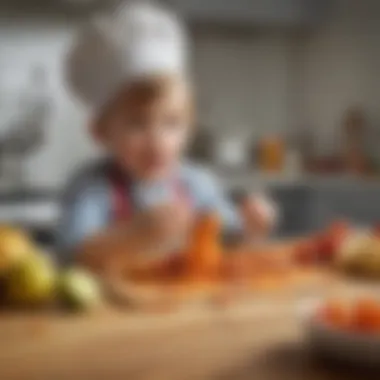
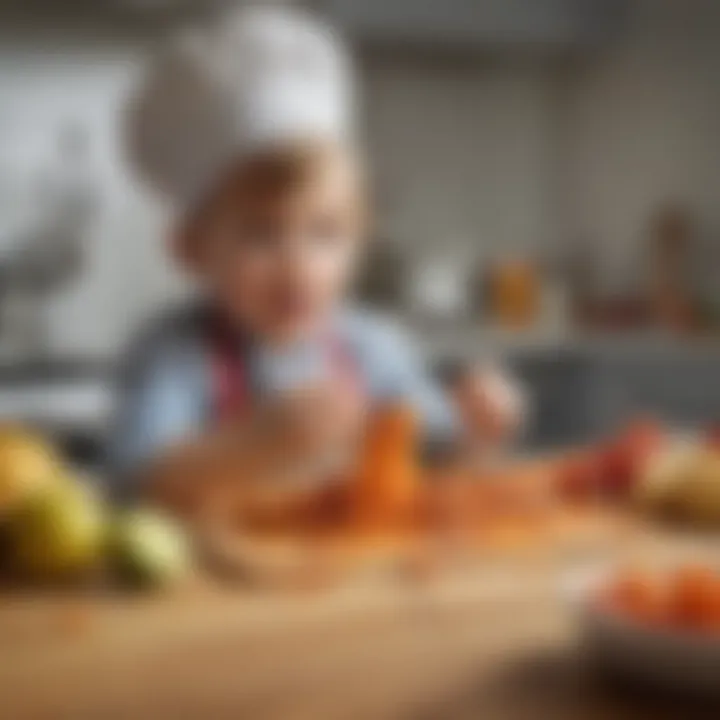
Integrating cultural awareness through cooking is not simply an educational strategy; it’s a means to enrich children’s lives. It creates opportunities for them to express their identities while learning about others in a supportive and engaging environment.
Family Involvement in Preschool Cooking Activities
Family involvement in preschool cooking activities is a crucial component of enhancing early childhood education. When families engage in cooking together, it fosters an environment of connection and learning. This collaboration not only strengthens family bonds but also enriches children's experiences in understanding food, nutrition, and cultural diversity. Moreover, when parents participate, they can learn about the educational benefits cooking brings to their children. They can witness firsthand how these activities help develop skills that are foundational to a child’s growth.
One significant aspect of family involvement is creating a sense of community. When families cook together or share recipes, it promotes shared experiences and cultural traditions. Children learn about their backgrounds and discover new ingredients and cooking methods. This offers an excellent opportunity for parents to discuss the origins of certain foods and why they are important to their culture, teaching deeper lessons about respect and appreciation for diversity.
Encouraging Parent-Child Interaction
Encouraging parent-child interaction through cooking is vital. It provides an informal setting where communication flourishes. In the kitchen, children may feel more comfortable expressing their thoughts. Cooking often involves asking questions about techniques, tastes, and preferences, allowing parents to guide discussions on related topics, such as health and nutrition. This interaction builds not just cooking skills, but also enhances verbal and social skills among children.
Extending Learning to the Home Environment
Extending learning to the home environment is another essential benefit of family involvement in preschool cooking. When families integrate cooking into their daily routines, the learning does not stop at school. Instead, it becomes a part of family life. Parents can introduce simple recipes using healthy ingredients, encouraging children to choose and explore foods. They can turn shopping trips into interactive lessons about nutrition and budgeting.
For example, a visit to the grocery store can become an educational outing. Parents can ask children to identify various fruits and vegetables, explaining their benefits and how they are prepared. This process enhances a child's understanding of healthy choices and everyday practices that contribute to their wellbeing.
Challenges in Implementing Preschool Kitchen Programs
The integration of preschool kitchens into early childhood education is beneficial, but it is not without its challenges. Understanding these obstacles can help educators and institutions navigate the complexities involved in establishing effective cooking programs. While the rewards are significant, the barriers must be addressed to maximize the potential of preschool kitchens as a learning environment.
Resource Limitations
Implementing a successful preschool kitchen often hinges on the availability of proper resources. This includes not only physical space but also equipment, ingredients, and adequate funding. Many preschools operate under tight budgets. As a result, obtaining necessary kitchen tools like age-appropriate utensils is a challenge. Without the right equipment, the safety of children during cooking activities is at risk.
Funding plays a crucial role in this context. Limited financial resources can restrain the purchase of equipment, leading to under-equipped kitchens that cannot support multiple cooking activities. Additionally, often there is a lack of sufficient storage space for ingredients, which may lead to food waste or spoilage. Schools are encouraged to explore community partnerships or grants to mitigate these limitations. Schools can seek support from local farms or grocery stores for ingredients, creating a sustainable cycle of resource sharing.
Training and Support for Educators
Another significant challenge is ensuring that educators receive adequate training and support. Not all teachers have a culinary background or experience in managing a kitchen environment. Cooking in a classroom setting requires not only culinary skills but also knowledge of educational strategies that promote experiential learning. Professional development programs must be developed to familiarize educators with the pedagogical aspects of cooking.
Moreover, ongoing support is critical. Educators may feel overwhelmed by the demands of a kitchen, especially if they lack support from administration or peers. Building a community of practice among educators who implement cooking activities can be beneficial. This collaboration promotes sharing ideas and troubleshooting common issues, making it easier to overcome challenges together.
Future of Preschool Kitchens in Education
The future of preschool kitchens holds significant promise as educational institutions increasingly recognize the value of culinary experiences in emotional, cognitive, and social development. The preschool kitchen is not merely a space for cooking but is evolving into a fundamental component of early childhood education. This fusion of education and culinary arts can nurture a love for food and foster a broader understanding of nutrition.
With the rise of interdisciplinary learning, preschool kitchens can become vibrant environments that encourage exploration across various subjects. Cooking integrates science, math, and literacy in practical settings, allowing children to engage meaningfully with what they learn. For instance, while measuring ingredients, children practice basic math skills, and when reading recipes, they enhance their literacy skills. Moreover, the sensory experiences of cooking can boost their observation and critical thinking, fostering an inquisitive spirit.
In today's society, where awareness about health and nutrition is paramount, preschool kitchens can play a vital role in establishing healthy habits from a young age. Teaching children the importance of fresh ingredients and balanced diets builds a foundation for lifelong well-being. Engaging families in this process can further reinforce these lessons at home, promoting a communal understanding of food and nutrition.
The implications of these kitchen experiences are broad and far-reaching. An environment that promotes culinary education creates a community of support and learning, which can reduce food waste and encourage sustainability practices among young learners. As societies shift toward more sustainable habits, incorporating discussions about local produce and environmental impact into preschool cooking classes becomes increasingly essential.
"Culinary practices in early education can provide children with the tools necessary for making informed choices about what they eat."
Therefore, investing in preschool kitchens not only bolsters the educational infrastructure but also cultivates a generation more aware of their food environment. The success of these programs will depend on evolving trends and methodologies that educators adopt to implement effective cooking curricula.These changes must adapt over time to reflect the diverse tastes and cultures represented within the classroom.
Trends in Educational Culinary Practices
As the landscape of early education evolves, so too do the culinary practices employed within preschool kitchens. More educators are recognizing the principles of experiential learning as vital means to engage preschoolers. This hands-on approach allows children to explore their surroundings through cooking, promoting sensory development.
Presently, several trends have emerged that shape educational culinary practices:
- Hands-On Learning: Direct involvement in cooking tasks cultivates curiosity and reinforces learning concepts.
- Seasonal Cooking: Utilizing seasonal ingredients fosters appreciation for the local environment and teaches relevant concepts regarding sustainability.
- Integration of Technology: Introducing age-appropriate technology in the kitchen gives children new tools for creativity while learning about food.
- Collaborative Projects: Group cooking activities enhance teamwork skills, teaching children the value of working together.
These emerging practices demonstrate a shift from traditional teaching methods to a more dynamic and responsive form of education. Integrating these elements into preschool kitchens emphasizes the need for continual adaptation in educational practices.
Envisioning Sustainable Preschool Kitchens
Sustainability is at the forefront of contemporary culinary conversations, and this concern is finding its way into preschool kitchens. Envisioning sustainable preschool kitchens starts with understanding the impact of food choices on the environment. Educators can cultivate a mindset of stewardship in children by discussing the origins of food and encouraging responsible consumption.
A few strategies for creating sustainable preschool kitchens include:
- Local Sourcing: Focusing on local ingredients reduces the carbon footprint associated with food transportation, promoting local economies.
- Garden Programs: Implementing small gardens where children can grow herbs and vegetables not only provides fresh ingredients but also teaches them about the growing process.
- Waste Reduction Workshops: Teaching children about composting and minimizing food waste can have lasting effects on their habits outside of the kitchen.
- Nutritional Education: Integrating lessons on nutritious foods underscores the connection between health and sustainability.







